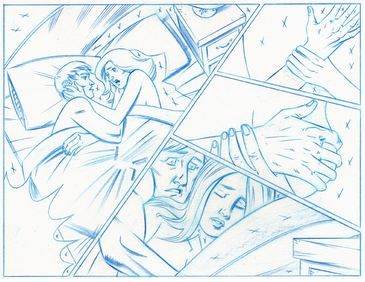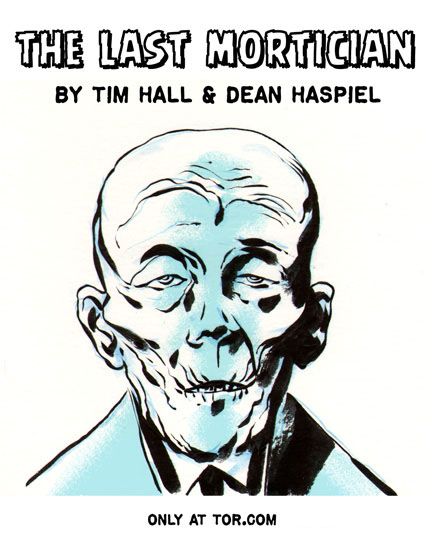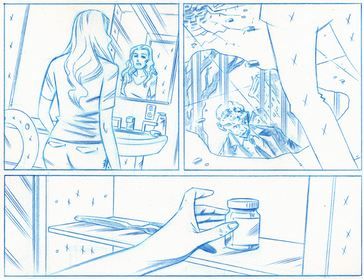Halloween seemed like the perfect time to run my email interview with writer Tim Hall regarding The Last Mortician, his first-time collaboration with his longtime friend, Dean Haspiel. The story, which explores death and love plus a great deal in between, launched earlier this month at Tor.com. Hall and Haspiel are storytellers that clearly relish challenging each other through their work. I appreciate Hall's eagerness to discuss his craft, as well as Haspiel's willingness to share some of the pencils for two panels. I really hope the creators' Frankenstein reboot (mentioned in our interview) breaks out of the lab soon to terrorize the masses.
Tim O'Shea: As a novelist and screenwriter who also works periodically in comics (and who is seemingly always busy with multiple creative efforts), what attracted you to working with Dean on The Last Mortician?
Tim Hall: Dean and I have known each other for almost 15 years, and have supported each other's work unconditionally and seen each other through some serious personal ups and downs. I have always had the greatest respect for Dean's work and he is without question the best reader and biggest supporter of my writing. So why hadn't we worked together before? First, we're idiots, but also because we were each in our own worlds. Dean approached me seriously about working together nearly two years ago now, and we've since worked on a lot of stories and pitches; this is just the first that's been published.
I know what you're thinking, and yes--it really is just like "When Harry Met Sally."
O'Shea: Were you intimidated at all when Dean explained (as noted in this Comic Archive mini-doc) he wanted the story to be political, religious and social commentary. Did you ever fear that Dean was too ambitious with his storytelling goal?
Hall: No, quite the opposite. There's a strong moral perspective in everything I write, and I'm very interested in what's happening in the world, politically and economically and in terms of media ecology. Dean knew that some big themes were inherent in the concept for The Last Mortician but he wasn't explicit about it--he just has good instincts. He knew he needed a strong opinion and worldview for this and he came to the right guy.
O'Shea: How is the process of world-building different when building for comics as opposed to prose?
Hall: Prose answer: "In comics you have a few dozen or maybe a couple hundred words to build a world; in prose you can go on indefinitely. Comics really test a writer's ability to self-edit, which is incredibly difficult but also the kind of challenge I thrive on."
Comics answer: "Economy."
O'Shea: How soon in developing the story did you realize there could be a message of romance/love in the midst of death?
Hall: Romance is the other major thread of all my writing; my first novel, Half Empty, was intended as a "romance novel for men"--which means lots of sex, of course. I view most things through the lens of how love or the lack of it shapes us as individuals and as a society.
O'Shea: Suicide in the face of immortality is an interesting concept to explore. But my question takes the topic on a left turn: Has suicide ever touched your life on some level?
Hall: Thankfully, no. I've lost plenty of people in my life to alcohol, drugs, and bitterness, which is why I don't indulge in any of those any more. But no suicides, thank God.
O'Shea: What was the most challenging aspect in the development of this story?
Hall: I'm not sure. Except for the hair pulling, sobbing, head banging, sleeplessness, panic attacks, flop sweats, upsetting my wife and scaring my kid, it was easy.
O'Shea: Out of the 16 pages, do you have a favorite scene or bit of dialogue?
Hall: My favorite is probably page 12, that beautiful split panel effect with the insets. By that point I think the heaviness and inevitability of the characters' choices are so overwhelming. It also has almost no words, which is very gratifying to me as a writer--the ultimate act of showing and not telling. Dean did a brilliant job on the entire story but that page still gives me a lump in my throat.
O'Shea: In terms of marketing a project, do you think there's an advantage to being able to say one of the creators is an Emmy-award winner?
Hall: I don't think of it in terms of advantage, it's simply a fact. Dean worked his ass off for that award and it's a part of his c.v. now; why not mention it? If people are impressed, then good--they should be.
O'Shea: While this is your first [published] collaboration, are you interested in collaborating together again?
Hall: Dean is a dream collaborator for me. He knows and understands comics so incredibly well and is also very literary himself. He also respects the deep experience and craft that I bring to the table and lets me do my thing.
Dean and I have some other projects that we are shopping, including a reboot of the Frankenstein legend, so I certainly hope there will be more collaborations in the future.
O'Shea: What else is on the creative horizon?
Hall: I moved back to NYC this summer with my family, to capitalize on a number of creative projects. I just finished a really funny mystery novel and am finally getting serious about a sci-fi story cycle that I've been sketching out for years. It took me a long time to be good enough to tackle genre projects in my own voice and from my own perspective, and I think these have great commercial potential. I hope my agent agrees.
O'Shea: Anything we need to discuss that I neglected to ask you about?
Hall: Well, I really wish you had asked me my recipe for the perfect tuna casserole.



